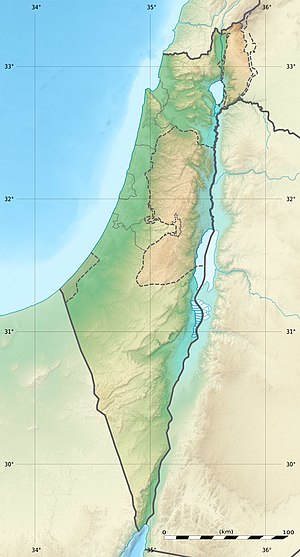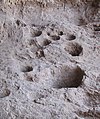Raqefet Cave
 Raqefet Cave entrance | |
Location in Israel | |
| Location | Upper Galilee |
|---|---|
| Region | Israel |
| History | |
| Periods | Middle Paleolithic |
| Cultures | Mousterian, Levantine Aurignacian, Natufian |
Raqefet Cave (Cyclamen Cave) is a Late Natufian archaeological site located in Mount Carmel in the north of Israel.[1]
History
[edit]Raqefet Cave was discovered in 1956. The site indicates plants were already used as food here before the advent of agriculture.[1]
Remains in one of the chambers of the cave suggest the production of beer during the occupation of the cave.[2][3] The earliest archaeological evidence of fermentation consists of 13,000-year-old residues of a beer with the consistency of gruel, used by the semi-nomadic Natufians for ritual feasting, at the Raqefet Cave.[4][5]
Earlier levels at Raqefet include remains from the Levantine Aurignacian.[6] Earlier Mousterian remains were also found at Site 187.[7]
In 2020, incised slabs were discovered at Raqefet Cave, with a human figure most likely shown as dancing.[8]
Gallery
[edit]-
Human remains
-
Rock mortars used to prepare malt for beer manufacture
-
Raqefet Cave rock mortars.
-
View of the valley from inside the cave
See also
[edit]References
[edit]- ^ a b Power, Robert; Rosen, Arlene; Nadel, Dani (2016). Phytolith evidence of the use of plants as food by Late Natufians at Raqefet Cave. Wild Harvest: Plants in the Hominin and Pre-Agrarian Human Worlds. Oxbow Books. p. 229. ISBN 9781785701245.
- ^ Metheny, Karen Bescherer; Beaudry, Mary C. (2015). Archaeology of Food: An Encyclopedia. Rowman & Littlefield. p. 46. ISBN 9780759123663.
- ^ Birch, Suzanne E. Pilaar (2018). Multispecies Archaeology. Routledge. p. 546. ISBN 9781317480648.
- ^ "'World's oldest brewery' found in cave in Israel, say researchers". British Broadcasting Corporation. 15 September 2018. Retrieved 15 September 2018.
- ^ "13,000-year-old brewery discovered in Israel, the oldest in the world". The Times of Israel. 12 September 2018. Retrieved 16 September 2018.
- ^ Shea, John J. (2013). Stone Tools in the Paleolithic and Neolithic Near East: A Guide. Cambridge University Press. pp. 150–151. ISBN 9781107006980.
- ^ "A Mousterian assemblage was also found on the floor of the Raqefet Cave (Site 187)" in Olami, Ya'aqov; Olami, Yaʻaqov (1984). Prehistoric Carmel. Israel Exploration Society. p. 177. ISBN 9789652220134.
- ^ Rosenberg, Danny; Chasan, Rivka; Lengyel, György; Nadel, Dani (2020). "Stone 'Canvas' and Natufian Art: An incised human figure from the Natufian cemetery at Raqefet Cave, Israel". Oxford Journal of Archaeology. 39 (2): 128–140. doi:10.1111/ojoa.12189. S2CID 216196387.
Bibliography
[edit]- Lengyel, György; Bocquentin, Fanny (2005). "Burials of Raqefet Cave in the Context of the Late Natufian". Mitekufat Haeven: Journal of the Israel Prehistoric Society / מתקופת האבן. ל"ה: 271–284. JSTOR 23383564.
- Liu, Li; Wang, Jiajing; Rosenberg, Danny; Zhao, Hao; Lengyel, György; Nadel, Dani (2018). "Fermented beverage and food storage in 13,000 y-old stone mortars at Raqefet Cave, Israel: Investigating Natufian ritual feasting". Journal of Archaeological Science: Reports. 21: 783–793. doi:10.1016/j.jasrep.2018.08.008. S2CID 165595175.
- Nadel, Dani; Rosenberg, Danny (2016). "A grid-like incised pattern inside a Natufian bedrock mortar, Raqefet Cave, Israel". Journal of Lithic Studies. 3 (3): 337–557. doi:10.2218/jls.v3i3.1467.
- Nadel, D.; Danin, A.; Power, R. C.; Rosen, A. M.; Bocquentin, F.; Tsatskin, A.; Rosenberg, D.; Yeshurun, R.; Weissbrod, L.; Rebollo, N. R.; Barzilai, O.; Boaretto, E. (2013). "Earliest floral grave lining from 13,700-11,700-y-old Natufian burials at Raqefet Cave, Mt. Carmel, Israel". Proceedings of the National Academy of Sciences. 110 (29): 11774–11778. Bibcode:2013PNAS..11011774N. doi:10.1073/pnas.1302277110. PMC 3718103. PMID 23818584.






